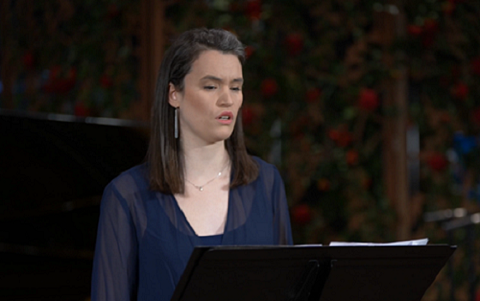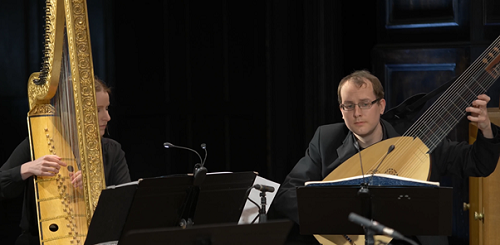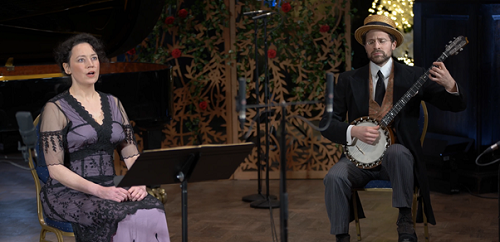Dame Emma Kirkby’s Live from London, Spring concert coincided with Mothering Sunday, and Kirkby and the ‘Friends’ whom she had invited to perform with her had curated an eclectic and warmly engaging programme which explored ‘motherhood’ and its ‘meaning’ in the broadest terms and contexts, bringing together the familial, national, international, environmental, spiritual and personal.
Abiding Love, as the programme was titled, followed a broadly chronological sequence – though by-passing the eighteenth and much of the nineteenth century – and began with Hildegarde of Bingen’s prayer ‘De Sancta Maria’, in which Kirkby was joined by mezzo-sopranos Helen Charlston and Patricia Hammond. Matt Redman’s accordion established a fittingly monastic air, and the freely roving melody above the sustained drone was celebratory and light, the individual voices cast in slightly different shades, enriched by their blending. The sweetness of the melismatic refrain, “Ora pro nobis ad tuum Natum, Stella maris, Maria” (pray for us to your Son, Mary, star of the sea), was wonderfully refreshing.
A seventeenth-century sequence followed. In Monteverdi’s ‘Venite, sitientes, ad aquas Domini’ (Come, you who thirst, to the waters of the Lord) Kirkby and Charlston were accompanied by husband-and-wife continuo duo Toby Carr (lute) and Aileen Henry (baroque harp). The music tripped lightly, Kirkby leading, Charlston following, the two voices intertwining in silky consonances and coy suspensions for the refrain, “Divinum mel et lac”, a sensuous vocal uncture of honey and milk. The two rocking continuo harmonies which propel the Virgin’s pleas in Tarquinio Merula’s ‘Canzonetta spirituale sopra La Nanna’ seemed progressively more insistent, and Charlston’s improvisatory appeals reached down into an earnest and fulsome lower register and upwards into the bright clarity of her upper range. Ever more emotive did the Virgin Mother’s urgings seem, as she lulled her child to sleep while recognising his future suffering. The lullaby closed with a wonderful resolution and harmonic consolation: “Poichè dorme la mia vita” (Now my life is asleep, peace). Barbara Strozzi’s sacri musicali affetti, ‘O Maria per la Madonna’, was sweetly and nimbly sung by Kirkby whose attentiveness to the text and quasi-ecstatic shine are not diminished by the passing years. The concluding “Alleluia” was buoyant and joyful.

Charlston’s performance of Purcell’s ‘The Blessed Virgin’s expostulation’ was a highlight of the concert. Published in the Harmonia Sacra (Volume 2), in 1693, it demonstrates Purcell surely unmatched response to the English language. Nahum Tate’s text depicts the twelve-year-old Jesus who has gone missing in the temple. Mary is distraught: she moves from panic, to doubt, to hope, to faith. Charlston captured every psychological twist and turn in a masterly rendition. The opening was fraught, but became more vehement, melismas making their mark. Four times Mary cries “Why?”, the pitch rising slightly each time, and each new peak had a different colour here. Perhaps the “wondrous birth” was but a “waking dream”, she fretted, the melismatic wandering suggesting her uncertainty. Mary similarly calls for Gabriel four times, but her trumpet-like leaps are replaced by slightly fragile repetitions, and Charlston coloured the fourth call with an ornament which suggest Mary’s desperation and waning faith. The mood changes effected by the swings between declamatory recitative and a gently swinging triple-metre lilt, and back again, were persuasive: the sudden harmonic shift, “Now (fatal change!)”, was startling, the very music itself seeming to weep. In the final section the affecting elaboration of the cadence, by voice and lute, at “Whilst Faith and Doubt my lab’ring Soul divide?”, was incredibly poignant.

Bellerofonte Castaldi’s ‘Capriccio detto Bischizzolo’ gave us the opportunity to enjoy a musical, if not a marital, ‘squabble’ between Carr and Henry, playfully and expertly conducted. And, then, we swept forwards to the twentieth century and Hindemith’s seldom-performed ‘Mariä Heimsuchung’, a setting of Rilke depicting Mary’s joyful meeting with her similarly pregnant cousin Elizabeth in the hills of Judaea. In a joyful and animated performance, Kirkby was accompanied by pianist Christopher Glynn, who was obviously delighted to have the opportunity to play the Blüthner piano which resides at St Anne and St Agnes, VOCES8’s ‘home’. Glynn and Redman, that latter playing the organ, formed a duo to accompany Patricia Hammond’s superb performance of the ‘luxta Crucem’ from Clémence de Grandval’s Stabat Mater. This was a compelling interpretation. The arching, encompassing repetitions of “in planctu desidero” (To stand beside the cross with you, and gladly share the weeping, this I desire) had depth of feeling, even fervour, but the line was beautifully controlled, and tinted expressively by the gentle two-note organ ‘sob’. There was movement forward during the second half of the text, “Virgo virginum praeclara mihi iam non sis amara fac me tecum plangere” (Chosen Virgin of virgins, be not bitter with me, let me weep with thee), but Hammond’s lovely pianissimo repetitions of “plangere” at the close of this section were intense and moving. The final melismatic repetitions of “in planctu desidero” reached out affectingly, and the evenness and lucidity of Hammond’s final long held high D above the rustlings in the piano and organ were impressive.
Then, we turned to America. Copland’s ‘Nature, the gentlest mother’ opens the composer’s song-cycle of Emily Dickinson settings. The lucidity and sparkle of Glynn’s piano accompaniment brilliant rendered Copland’s musical imagery and Charlston’s mezzo was translucent but firm. The leaping curves of the final phrase, “Wills silence everywhere”, sculpted vast spaces. Dickinson blends natural and spiritual imagery and here we had a vocal intimation of a cathedral-like universe.
Juliana Hall’s ‘To Mother’ is a setting of an excerpt from the diary of American poet and playwright, Edna St. Vincent Millay. This rather effulgent testament of a daughter’s love was delivered with joy and sincerity, the stream of sweet melody capturing the unaffected emotion. In contrast, Ilse Weber’s ‘Wiegala’ was more troubling and poignant. The Jewish writer, poet and broadcaster was imprisoned in the Theresienstadt concentration camp with her husband Willi and son Tommy. She worked as a nurse in the children’s infirmary, but her only ‘medicine’ was her music: she would sing to the children, accompanying herself with her guitar. Charlston performed Hall’s lullaby – a jumble of nursery rhymes and nonsense words – with a soothing simplicity, the triple-time lilt both touchingly fragile and reassuring. The quietening of the final stanza was very affecting.

The laments of mothers whose sons must don a soldier’s uniform were heard in the closing sequence, framing a recitation by the four female performers of Julia Ward Howe’s ‘Appeal to womanhood throughout the world’ of 1870, a proclamation to establish a day of peace. George Frederick Root’s ‘Just before the battle, mother’ was written during the American Civil War and Matt Redman accompanied Hammond on a Victorian zither banjo and also provided some charming and touching vocal counter-melodies. Both performers conveyed the essential dignity of this song and its sentiments. Hammond’s rendition of Al Piantadosi’s 1914 anti-war song, ‘I didn’t raise my boy to be a soldier’, was no less stirring, with Redman swapping his banjo for a Gibson L4 guitar from 1911. Initiated by an accordian summons, as we had begun, Margarita Mimi Fariña’s ‘Bread and Roses’ was a stirring close, sustaining the suffragette’s rallying cry, with Hammond leading the other performers in a rousing declaration of recognition and renewal: “a sharing of life’s glories: Bread and roses! Bread and roses!”
This concert is available on demand at: https://voces8.foundation/livefromlondon-spring
Claire Seymour
Dame Emma Kirkby (soprano), Helen Charlston (mezzo soprano), Patricia Hammond (mezzo soprano), Christopher Glynn (piano), Toby Carr (lute), Aileen Henry (baroque harp) Matt Redman (accordion, banjo, guitar, organ)
Hildegarde of Bingen – ‘De Sancta Maria’, Monteverdi – ‘Venite, sitientes, ad aquas Domini’, Tarquinio Merula – ‘Canzonetta spirituale sopra La Nanna, Barbara Strozzi – ‘O Maria per la Madonna’, Purcell – ‘The Blessed Virgin’s expostulation, Bellerofonte Castaldi – ‘Capriccio detto Bischizzolo’, Hindemith – ‘Mariä Heimsuchung’, Clémence de Grandval – ‘Iuxta Crucem’ (from Stabat Mater), Copland – ‘Nature, the gentlest mother’, Juliana Hall – ‘To Mother’, Ilse Weber – ‘Wiegala’, George Frederick Root – ‘Just before the battle, mother’, Julia Ward Howe – ‘Appeal to womanhood throughout the world’ (1870), Al Piantadosi – ‘I didn’t raise my boy to be a soldier’, Margarita Mimi Fariña – ‘Bread and Roses’.
St Anne and St Agnes, VOCES8 Centre, City of London; Sunday 14th March 2021 (live stream).
ABOVE: Dame Emma Kirkby